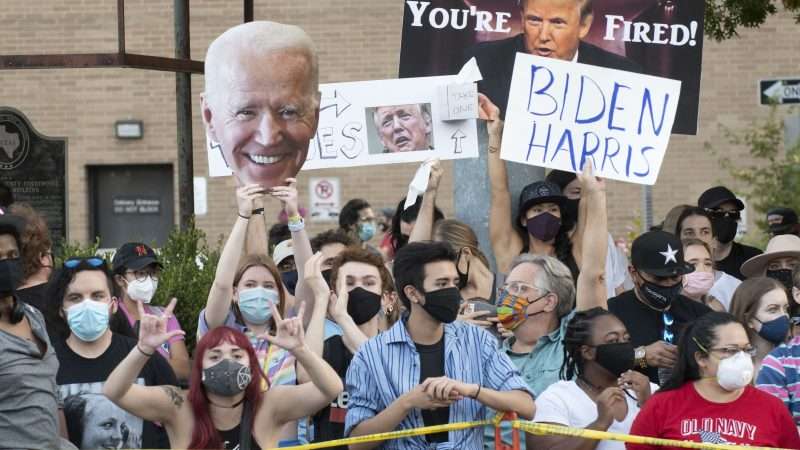1. Political identity is increasingly important to Americans.
2. Concomitantly, Americans increasingly disdain people “on the other side.” For example, only 50% of Republicans and 41% of Democrats were sure it would not upset them if their child married someone of the other political party. One can reasonably assume that this statistic would be worse if one asked “progressives” about “conservatives” and vice versa.
3. In a healthy liberal democracy, intermediary institutions serve as buffers between the public and the state, and give the public institutions and individuals to identify with and trust beyond partisan politics.
4. In the electoral realm, our two warring political tribes are roughly split, both in terms of strong partisans and their ability to win over less partisan voters.
5. In the cultural realm, however, major mainstream institutions are dominated by the broad left, with the more-radical left increasingly gaining ground within the left. Such institutions include the legacy media (or “MSM”) such as the New York Times and NPR; the arts; Hollywood; the organized bar and many other professional associations; universities; the K-12 educational establishment, to include most elite private schools; corporate bureaucracies, particularly at growing tech companies; and even professional sports, once a bastion of implicit conservatism, has increasingly gone woke.
6. One can debate the causes of this dominance, whether it’s a result of differing career preferences among conservatives and liberals, geographic concentrations of each group, discrimination by the establishment, gaps in intelligence and education between liberals and conservatives, and any combination thereof. That is all irrelevant to where I’m going with this.
7. As these institutions have become more and more dominated by progressives, conservatives have been fleeing them, for example, watching Fox News or OAN rather than listening to NPR. This gives these institutions even less reason to worry about being dominated by progressives, and further increases progressive domination. (As an aside, I was recently part of a conversation on Facebook in which a bunch of very well-educated libertarian-leaning academics were discussing how we used to enjoy NPR despite its liberal slant, but that it’s become so unbalanced, one-sided, and overtly ideological that it’s like listening to a propaganda station and we listen a lot less if at all. If this is how urbane libertarians with much cultural commonality with the NPR staff thinks, imagine what your small-town evangelical Christian conservative thinks…)
8. At some point, many right-leaning people begin to think of these major cultural institutions at best as things they don’t have a stake in, and at worse as “the enemy.”
9. It’s not a healthy development in a liberal democracy for a large group of citizens to reject the major intermediary institutions of society, as it leaves them prone to demagoguery, conspiracism, and, not to put to fine a part on it, fascistic appeals, as the essence of fascism is to try to create a direct emotional connection between the state and its leader and the public at large.
10. We have seen this play out, I don’t think I need to elaborate on that. We are fortunate that the demagogic leader was more or a narcissist than an actual fascist.
11. The institutions noted above in “7” should try to assimilate right-leaning people into their staffs. Imagine, for example, if major universities had even 10% conservatives in their Humanities departments, or the New York Times and NPR had 10% conservatives among their reporters. This would have a few salutary effects. People on the right wouldn’t feel that these institutions are trying to exclude them entirely, which is in fact an increasing trend (recall how employees at the Atlantic revolted when the company hired Kevin Williamson); employees on the right are more likely to address, even if in non-ideological terms, issues that people on the right care about (say, news reporting about harassment of Christians abroad, or the latest big gun convention); and it would make the tone of what these institutions do less hostile to the right. On the latter point, there is much ideological discrimination in hiring in the legal academy. But my Federalist Society friends almost universally state that they are treated fairly once they get a job, and that their mere presence at a faculty meeting or hiring committee meeting tends to tamp down more overt displays of hostility to conservatives.
12. Note that my claim is not (a) that these institutions lean too far left, because I have no objective measure of that or (b) that conservatives “deserve” representation at these institutions in some moral or normative sense.
13. Rather, I am concerned about institutional legitimacy. When you have a country divided into two tribes, and one tribe increasingly dominates most major cultural institutions, regardless of why, those institutions will gradually lose legitimacy within the other tribe.
14. Imagine instead of liberals and conservatives, the U.S. was divided between Catholics and Protestants. Each group did about equally well in elections, but the Catholics dominated the media, the arts, the universities, and so on. Would this be socially healthy, or a recipe for future civil conflict? If a demagogue–a former Catholic, no less–arose among the Protestants talking about the fake Catholic news and insisting that the Catholic establishment was going to, and eventually did plot to prevent his election, would you expect all the Protestants to believe the establishment from which they are excluded, or would a significant fraction be inclined to believe “one of their own?”
15. For the reasons stated above (and I repeat) our major cultural institutions should try to assimilate right-leaning people into their staffs and leadership. How they would do so, on what terms, and how they would overcome the objections of their own tribe are beyond the scope of this post. But the first order of business is to recognize the problem, and try to overcome it. (And, by the way, not by hiring from among the 2% or so of the population that is strongly libertarian leaning like I am, which would not do much to resolve the underlying problem.)
from Latest – Reason.com https://ift.tt/3nSvuak
via IFTTT


